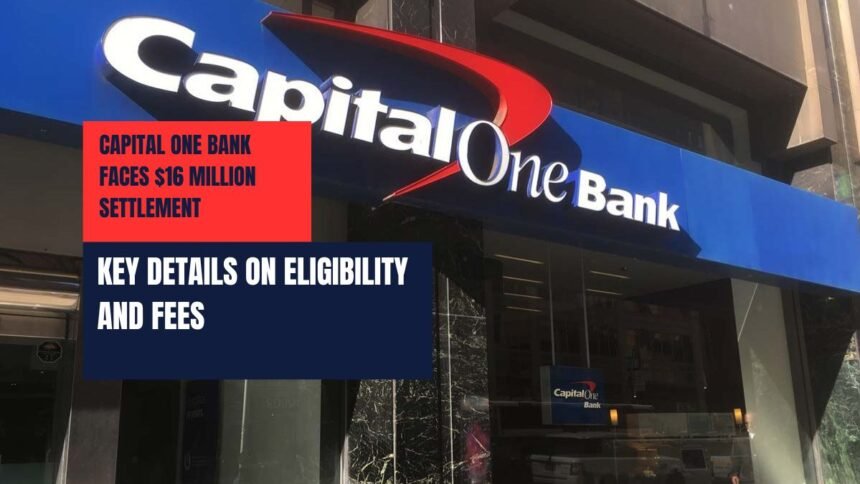In 2023, Capital One Bank was sued for unfairly charging “representment fees” on checks and ACH transactions that bounced due to insufficient funds but were later cleared when funds became available. If you had an account with Capital One during the relevant period and were charged these fees, you might be eligible for compensation. Here’s a detailed overview of the lawsuit, the settlement details, eligibility requirements, and what you can do to avoid similar fees in the future.
The Lawsuit
The class-action lawsuit against Capital One Bank centered on its practice of charging representment fees. These fees are applied when a transaction, such as a check or ACH payment, fails initially due to insufficient funds (NSF) but is successful after funds are added. The lawsuit argued that charging these fees was unfair since the transactions eventually cleared. This practice led to the legal action.
Settlement Details
In June 2024, the lawsuit was settled with a total payout of $16 million. Here’s a summary of the settlement details:
| Settlement Details | Information |
|---|---|
| Total Settlement Amount | $16 million |
| Coverage Period | September 1, 2015 – January 12, 2022 |
| Claims Window | Likely closed; check your statements for updates |
| Expected Distribution Date | By June 2024 |
The settlement fund will be distributed to eligible claimants who filed their claims within the established timeframe. If you were charged these fees, monitor your bank statements and online banking for any updates. If you notice unfair fees, contact your bank for possible reversal.
Eligibility
To be eligible for a share of the settlement, you must meet these criteria:
| Eligibility Criteria | Requirements |
|---|---|
| Capital One Account Holder | Had an account between September 1, 2015, and January 12, 2022 |
| Charged Representment Fees | Incurred representment fees on checks or ACH transactions |
| Successful Clearance | Transactions eventually cleared successfully after the fees were charged |
Only individuals who were charged these specific fees and had successful transactions later are eligible for compensation. Note that the claims window for filing has likely closed.
Settlement Amount
The $16 million settlement will be divided among all eligible claimants. The payout amount per individual will vary based on:
| Settlement Fund | Details |
|---|---|
| Total Amount | $16 million |
| Distribution Basis | Number of valid claims filed |
| Individual Payout | Varies depending on total claims and validity |
The total settlement amount will not be equally divided. Instead, it will be distributed based on the number of valid claims and the specifics of each claim.
Capital One Data Breach
It’s important to distinguish between this lawsuit and the 2019 Capital One data breach lawsuit:
| Data Breach Lawsuit | Details |
|---|---|
| Settlement Conclusion | Settled in 2022 |
| Claims Deadline | Passed |
| Current Services Available | Identity theft protection until February 13, 2028 |
If you were affected by the data breach but did not file a claim, you can still access identity theft protection services until early 2028.
Avoiding Future Fees
To prevent similar fees in the future, follow these steps:
| Preventive Measures | Tips |
|---|---|
| Maintain Sufficient Funds | Ensure your account has enough money to cover transactions |
| Regular Monitoring | Check bank statements and online banking regularly |
| Contact Your Bank | Report unfair fees and request a possible reversal |
By maintaining sufficient funds, regularly monitoring your accounts, and contacting your bank when needed, you can reduce the risk of incurring unnecessary fees.
Conclusion
The Capital One Bank class-action lawsuit highlights the importance of understanding your bank’s fee policies. Although the claims window for this settlement has likely closed, staying informed about such cases can help you manage your finances better and avoid future issues with bank charges.
FAQ’s
What is the Capital One Bank class action lawsuit about?
The Capital One Bank class action lawsuit concerns fees charged for representment transactions. These fees are applied when a check or ACH payment fails due to insufficient funds but is later successful after funds are added. The lawsuit claims these fees were unfairly charged even when transactions eventually cleared.
How much is the Capital One lawsuit settlement, and when will I get paid?
The settlement amount is $16 million, covering representment fees charged from September 1, 2015, to January 12, 2022. The settlement is expected to be distributed by June 2024. The exact payout for each claimant will vary based on the number of valid claims.
How do I know if I’m eligible for the settlement?
To be eligible, you must have been a Capital One account holder during the relevant period, incurred representment fees on checks or ACH transactions, and those transactions must have eventually cleared successfully. The claims window for filing has likely closed, so check your bank statements for any updates.





